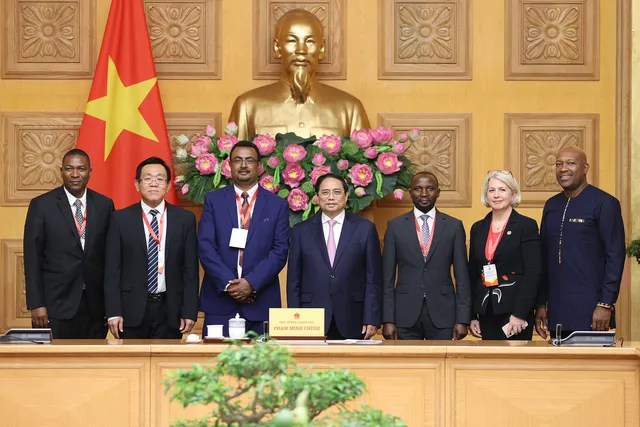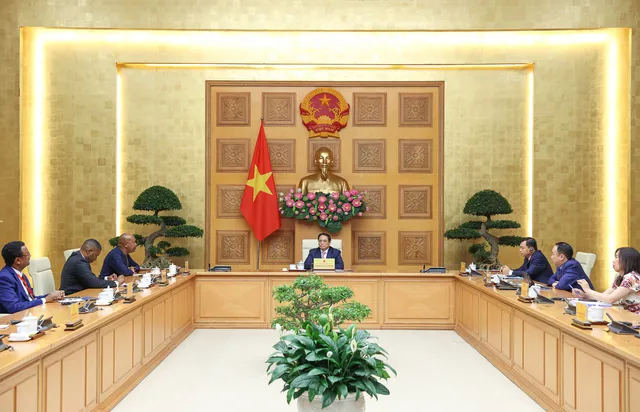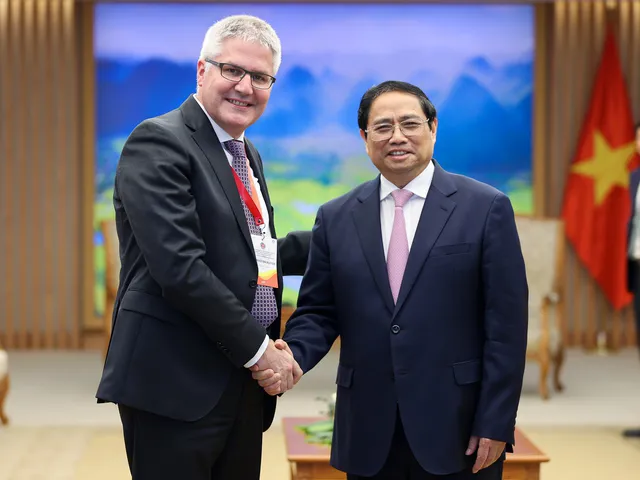Vietnam ready to share experience with partners in food security
Vietnam is now one of the world's leading exporters of agro-forestry-fishery products, with total exports of over $53 billion in 2022 and access to 196 countries and territories worldwide.
Vietnam is willing to share its experience and cooperate with other countries in agricultural and rural development, poverty reduction, and food security through South-South cooperation programs.
| Prime Minister Pham Minh Chinh and delegates at the meeting. Photos: Nhat Bac |
Prime Minister Pham Minh Chinh made the remarks during a meeting on April 24 with a delegation of agriculture ministers from countries currently in Vietnam to attend the 4th Global Conference of the One Planet Network's Sustainable Food Systems (SFS) Program from April 24-27.
The Prime Minister recognized the critical role of the SFS Program in the collective effort to achieve all 17 Sustainable Development Goals (SDGs) set by the United Nations, with a particular focus on leaving no one behind, especially in ensuring food security.
"To achieve the SDGs, it is imperative to overhaul food systems to prioritize transparency, accountability, and sustainability. This includes ensuring access to adequate food and nutrition for all, protecting the environment, conserving natural resources, and adapting to the impacts of climate change," Chinh said.
He emphasized that the conference was well-timed, as it addressed the pressing needs of countries grappling with the repercussions of the Covid-19 pandemic on global health, social security, and disruptions to the food supply chain, resulting in food crises in various regions around the world.
Addressing global challenges such as food security, climate change, natural disasters, epidemics, and environmental pollution requires a collaborative and inclusive approach that upholds multilateralism and fosters international solidarity, Chinh said, adding that these issues have far-reaching impacts on entire populations and therefore require comprehensive and people-centered solutions.
| Overview of the meeting. |
Despite enduring years of war and embargoes, Vietnam has made significant strides in its economic development over the past 35 years of Doi moi (Renewal). The size of Vietnam's economy has grown from $4 billion to $409 billion, and GDP per capita has risen from $160 to over $4,100.
"In the face of a rapidly changing global landscape, Vietnam has prioritized and continued to maintain macroeconomic stability, inflation control, and inclusive growth while ensuring social security, including food and nutrition security and export balance," Chinh said.
Chinh added that Vietnam recognizes agriculture as the backbone of its economy, contributing to improving living standards and maintaining political stability, social order, and security. Food security is considered a crucial component of human security and a prerequisite for realizing the right to life.
With over 60% of the population in rural areas dependent on agriculture for their livelihoods and the agriculture sector employing 30% of the national labor force and contributing nearly 12% to GDP, Vietnam is now one of the world's leading exporters of agro-forestry-fishery products, with the total exports of over $53 billion in 2022, and access to 196 countries and territories worldwide.
"Vietnam is also actively pursuing agricultural modernization, organic farming, rural development, and sustainable agricultural practices to increase value-added and promote long-term and sustainable agricultural economic growth," he said.
Chinh expressed gratitude for the international community's valuable support and effective cooperation, especially regarding capital, technology, and management experience in the agricultural sector.
He added that the Vietnamese Government had issued a "National Action Plan to Transform a Transparent, Responsible and Sustainable Food System in Vietnam by 2030" and is committed to working with other countries to expand cooperation in research, policy formulation, and replication of sustainable food and agriculture models that are green, environmentally friendly, low emission and sustainable.
"This includes ensuring food security for the Vietnamese people and making practical contributions to global food security," he said.
Chinh also suggested that developing countries enhance the effectiveness of South-South cooperation, under which Vietnam is willing to share its experience and cooperate with other countries in areas such as agricultural and rural development, poverty alleviation, and food security through South-South cooperation programs and tripartite cooperation, with the support and partnership of bilateral and multilateral international partners.
To effectively implement the transformation of food and food systems and strengthen international cooperation in agriculture and rural areas in the future, the Prime Minister called on relevant parties to raise awareness about the importance and role of the agricultural sector, focus on institution building, attract capital, conduct research and apply technology, especially in post-harvest technology, ensure seed sources, plant protection, fertilizer, and natural disaster response.
Meanwhile, he said measures such as climate change adaptation, production organization and management, quality human resources training, productivity improvement, and product value enhancement should be intensified.
At the meeting, heads of agriculture ministries from various countries and Beverley Postma, Executive Director of Growth Asia, welcomed Vietnam's initiative to organize the conference in the face of global risks to the food supply chain and expressed their appreciation for the respectful and warm welcome extended by the country. The delegates shared their thoughts on transforming food and food systems, emphasizing the importance of food security and food sovereignty for humanity and nations.
The agriculture officials admired Vietnam's efforts, achievements, and inspiring lessons and experiences in its struggle for independence, national reunification, and socio-economic development, especially in the agricultural sector and in ensuring food security.
They acknowledged Vietnam's contribution to poverty reduction, improvement of living standards, and its emergence as a major food exporter in the world, confirming its role in the global food production and supply chain, which is a dream for many countries, including those in Africa.
The delegate also appreciated Vietnam's commitment and goals in transforming its food systems to be healthy, sustainable, climate-resilient, and inclusive. They agreed with the views of the Vietnamese Prime Minister on food security, agricultural development, and cooperation proposals and hoped that Vietnam would share its expertise and experience and cooperate in ensuring food security, especially in rice, coffee, seafood, and other agricultural sectors.
| Prime Minister Chinh and Director of the Swiss Federal Office for Agriculture Christian Hofer. |
On the same day, Prime Minister Chinh met with Mr. Christian Hofer, Director of the Swiss Federal Office for Agriculture, who is currently in Vietnam, to attend the One Planet Network's 4th Global Conference of the SFS Program.
Prime Minister Pham Minh Chinh and Minister Christian Hofer highly appreciated the results of the Vietnam-Switzerland relations, which have been established for over 50 years.
Switzerland is an important trading partner of Vietnam in Europe and ranks as the 6th largest European investor in Vietnam, with a total investment of about $2 billion. It is also one of the few Western European countries that have maintained development assistance and economic cooperation with Vietnam over the past three decades.
They believed that Vietnam and Switzerland have great potential and opportunities to strengthen cooperation in various fields.
Building on the traditional friendship and multifaceted cooperation between the two countries, both leaders expressed confidence that bilateral relations, including agriculture and food security, will be further strengthened and developed.
Prime Minister Chinh emphasized the crucial role and position of agriculture in Vietnam and the need to change the perception of agriculture, properly assess its value, and mobilize resources for agricultural development, including sustainable food production.
Chinh called on Switzerland to continue to provide ODA projects related to agriculture, rural areas, and farmers in Vietnam, especially in the Mekong Delta region. The Prime Minister also stressed the importance of cooperation in capital exchange and investment, science and technology, human resources training, management science, and institution building, including agriculture.
He expressed hope for Switzerland's support in helping Vietnam participate in the supply chain and expand its market in Switzerland and other European countries, especially for agricultural products where Vietnam has strengths and Switzerland has demand, such as vegetables, fruits, coffee, cashew nuts, macadamia nuts, pepper, and beans.
Chinh and the guest also discussed the need to cooperate in the research and development of plant and animal varieties to improve the quality and efficiency of agricultural production and to exchange information and strategic forecasts, including market forecasts, with a view to mutual benefit.
The Swiss Minister of Agriculture thanked the Prime Minister for the warm welcome and shared that he was pleasantly surprised by Vietnam's remarkable changes and development since his last visit 20 years ago.
Minister Christian Hofer acknowledged and appreciated Vietnam's innovative role in the 4th Global Conference of the One Planet Network's SFS Program and its capacity in the agricultural production chain, which contributes to ensuring global food security.
The Minister stressed that Switzerland has renowned enterprises and universities that can cooperate with Vietnam in various fields, including the development of high-quality agriculture. He expressed Switzerland's willingness to support and cooperate with Vietnam in developing organic agriculture and participating in the global supply chain and hoped that Vietnam and Switzerland would negotiate and sign a free trade agreement to promote trade exchanges between the two countries.















